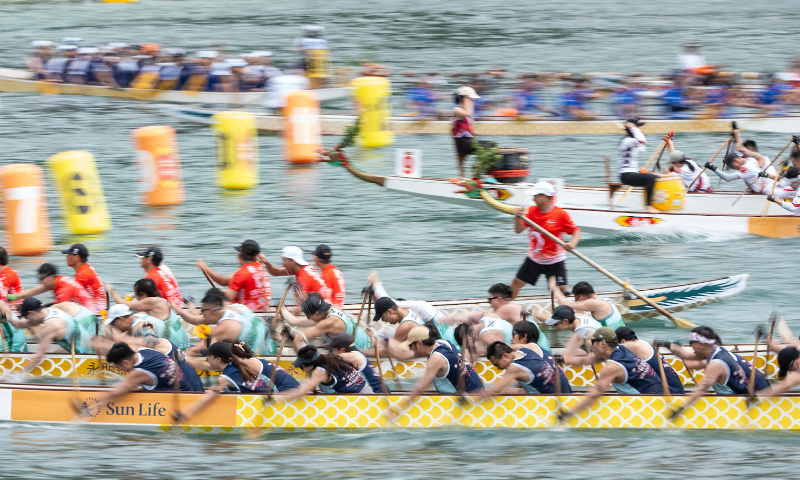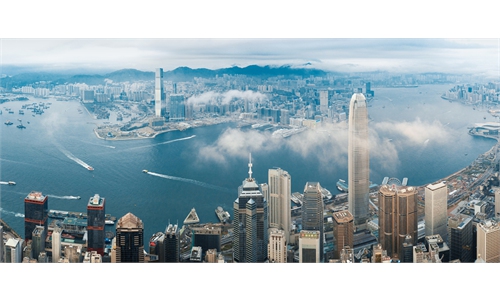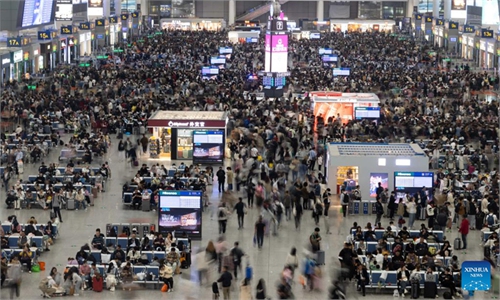
Competitors participate in the annual dragon boat race in Hong Kong on June 10, 2024. Photo: VCG
During the three-day Dragon Boat Festival holidays from June 8 to 10, cities in the Guangdong-Hong Kong-Macao Greater Bay Area showed a trend of "two-way travel" and "two-way consumption."
Hong Kong's Dragon Boat Festival celebrations organized by the Hong Kong Special Administrative Region (HKSAR) government, featuring captivating drone displays and races in various locations like Tai O, Sha Tin and Stanley, have enticed around 330,000 mainland tourists during the holidays.
"It's awe-inspiring," said Huang Na on popular Chinese social media platform Xiaohongshu, as footage captured the enchanting spectacle of zongzi (glutinous rice dumplings) and dragon-shaped drones amid bustling crowds along the Wan Chai waterfront. The fusion of tradition and innovation in the drone show has garnered widespread praise on social media.
In addition to these holiday festivities, exploring cultural exhibitions, perusing quaint street shops and embarking on leisurely city walks have become essential experiences for anyone touring the vibrant city.
Madame Tussauds Hong Kong, M+ Museum, Hong Kong Science Museum, Hong Kong Space Museum and Hong Kong Museum of History were among the top five searched destinations since April, with bookings for the Hong Kong Science Museum up 38 percent year-on-year and Harbour City Art Museum up 62 percent, media reported, citing online booking platform Meituan.
Tourism industry representatives told the Global Times that the end of gaokao, the national college entrance examination, the holding of a number of major events in Hong Kong and cheaper hotels in the off-season were all conducive to attracting mainland travelers to Hong Kong.
At the same time, Hong Kong residents made a total of 1.17 million trips out of the city during the Dragon Boat Festival holidays, with 910,000 people traveling to the mainland, accounting for about 78 percent of the total, according to Immigration Department figures.
Compared to the data in Easter holiday, the upsurge of Hong Kong residents heading to the mainland have shown a slight retreat. During the 4-day Easter holiday this year, the number of outbound trips reached 2.19 million, according to Hong Kong's Immigration Department.
Hong Kong's Travel Industry Council (TIC) chairperson Gianna Hsu was quoted by Sing Tao News as saying that the retreat was driven by numerous events held in Hong Kong, triggering many to rather stay in the city to spend their holiday. Holding large-scale events does not only attract tourists to Hong Kong, but also encourages local people to spend money in Hong Kong, industry observers said.
The Hong Kong events calendar for the second half of 2024 showed that the HKSAR government has increased the number of events for the year to more than 210, an increase of more than 40 percent. This includes 42 convention and exhibition events, 25 cultural, arts and creative events, and 15 sports events, becoming the "new fuel" to Hong Kong being a "grand events" hosting city.
This is equivalent to at least one event being held in Hong Kong every two days. A wide range of attractive activities will create synergies that will enable visitors to stay longer and spend more, according to HKSAR Chief Executive Lee Ka-chiu. The annual event is expected to attract about 1.7 million visitors and bring about HK $7.2 billion in spending.
New potential to be unleashed
The integration process between Hong Kong and other cities in the Greater Bay Area has accelerated, and cross-regional consumption has become the norm, reflecting the deepening of regional economic integration and the emergence of synergies, Liang Haiming, President of Belt and Road Research Institute of Hainan University, told the Global Times.
When Hong Kong residents travel to other Greater Bay Area cities, the process will not just boost the growth of local tourism, dining, shopping, entertainment, and other associated sectors, but also foster increased cultural interaction and comprehension with the mainland, Liang noted.
There is also a trend of more Hong Kong residents traveling to mainland cities through high-speed trains, such as Changsha, the capital city of Central China's Hunan Province.
The restart of the cross-provincial trains that connect Hong Kong to Beijing, Changsha, Hangzhou, Shanghai, Wuhan and other cities on April 1, 2023 allows Hong Kong residents to travel to mainland cities more conveniently.
Ray, a Hong Kong resident, went to Southwest China's Yunnan Province with his family during this Dragon Boat Festival holidays. He told the Global Times that traveling to more mainland cities has been one of his annual plans. "Taking the high-speed train itself is a special experience for us," Ray said.
Timothy Chui Ting-pong, director of the Travel Industry Council of Hong Kong, told the Global Times that facing a fast-growing mainland, Hong Kong should be more active in making connections, and in turn this will benefit Hong Kong.
While the extensive outbound tourism activities of Hong Kong residents may have certain adverse effects on the local retail and service sectors, industry experts are optimistic that there is untapped potential to boost spending among tourists.
During peak travel periods, some consumers tend to choose shopping in the other Greater Bay Area cities in the mainland where prices are relatively competitive, which may reduce local consumption spending in the short term, affecting the operating income of retailers and service providers in Hong Kong, Li, who owns a shop in Tsim Sha Tsui, told the Global Times.
Li remains optimistic, noting that May and June are typically off-season periods for Hong Kong tourism, and his revenue has not yet met his pre-epidemic expectations. However, with the summer holiday season approaching, Hong Kong's tourism industry is poised to seize more opportunities.
On July 1 this year, Hong Kong will commemorate the 27th anniversary of its return to the motherland. Chief Executive Lee announced that more than 1,000 restaurants and food markets will offer discounts to celebrate the occasion, which is expected to attract a new wave of tourists.
Additionally, free entry to museums, tram rides and discounted tickets to various attractions in the city will be available on July 1, as stated by Lee.
In order to host the numerous scheduled events mentioned above, Hong Kong has actively improved the hardware and software supporting facilities.
News reports showed that Hong Kong's largest sports infrastructure project, the Kai Tak Sports Park, will be completed by the end of this year with a 50,000-seat stadium and a 10,000-seat stadium. Kevin YEUNG Yun-hung, Secretary for Culture, Sports and Tourism said that hopefully the huge facility can be used to support more events and performances in the next two years for the city to not only promote the development of sports and tourism but also bring economic benefits to Hong Kong.
Hong Kong can further unleash its potential as an international metropolitan and transportation hub, Chui said.
The attractiveness of Hong Kong lies in its internationalization, efficiency and the provision of value-for-money services, combined with traditional tourist attractions such as Victoria Harbour, the Star Ferry, the peak tram, and the juxtaposition of ancient and modern cityscapes. Hong Kong's allure still remains, Chui said.




